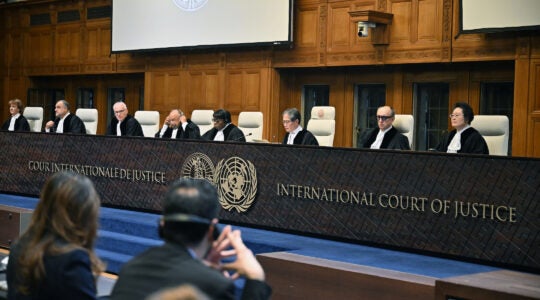
New York City Mayor Michael Bloomberg, center, with Sderot Mayor David Bouskila and a Sderot police official on Jan. 4, 2009, stands in front of a collection of Kassam rockets that have hit the southern Israeli city in the past eight years. (Spencer Tucker/Office of Mayor Bloomberg)

Prime Minister Ehud Olmert meets in Jerusalem with a delegation from the Conference of Presidents of Major American Jewish Organizations on Jan. 4, 2009. (Amos Gershom/GPO)
SDEROT, Israel (JTA) — American Jewish leaders on a solidarity visit to this besieged southern Israel city learned quickly what life was like under fire.
On Sunday, when a Code Red alert was sounded, they were rushed into a protected room. Seconds later a tremendous crash was heard — a Hamas rocket had struck just 300 feet from the police station where they had sought shelter.
"It was such a thud, believe me, something you don’t forget," said Malcolm Hoenlein, the executive vice chairman of the Conference of Presidents of Major American Jewish Organizations, a few hours later. "The building shook."
"This was so close and so impactful in terms of recognizing the vulnerability to it and the unpredictability of it because it can strike anywhere at any time," he said, adding, "you can never not be on alert."
With Israeli tanks rumbling into yet another war, the delegation sent by the Presidents Confence to Sderot marks the first wave of solidarity visits by American Jews.
"We felt we had to be here not just in spirit but body to communicate the message that the people of Israel are not alone," said Hoenlein.
Participants say they are motivated to see the situation on the ground so they can return home and provide a firsthand account of Israel’s perspective. Many have been on past solidarity visits — most recently during the 2006 Lebanon War, and before then at particularly tense times during the most recent Palestinian uprising, as well as the 1991 Gulf War.
It’s also a chance to meet with Israel’s military and political upper echelon, who despite the tense situation make time for such visitors knowing that they can be effective advocates for the Israeli cause upon their return to the United States.
The Presidents Conference group met with Prime Minister Ehud Olmert, Foreign Minister Tzipi Livni, President Shimon Peres and opposition leader Benjamin Netanyahu. The members also had plans to see the operation’s architect, Defense Minister Ehud Barak.
In these meetings, the American Jewish leaders have been hearing details about how Israel prepared for the military assault that on the night of Jan. 3 went from massive air attacks to a ground war, as well as insight into what Israeli officials hope to achieve by the military operations.
"We got a very good sense of what is happening and what the message is we should be getting out to the world," said Ronald Lauder, a past chairman of the Presidents Conference and president of the World Jewish Congress.
That message, he said, was twofold: Israel’s military needs to bring an end to Hamas’ rocket fire and weapons smuggling, and to accomplish these goals, Israel probably would need time despite international pressure for a swift cease-fire deal.
New York City Mayor Michael Bloomberg also was in Sderot Sunday on a brief solidarity tour stop — and also experienced an alert for incoming rocket fire. As the alert sounded, security guards frantically pushed him and his entourage into a protected room and slammed shut the door behind them.
"I think intellectually I understood what the people of Sderot were going through, but this time it’s more etched in my memory and more personal than reading about it or seeing it on television," Bloomberg said.
As the mayor stepped through the ruins of a house that had been hit by a rocket just hours before he arrived, a man named Yigal whose mother lived next door shouted, "Tell Obama to give a green light to the Israeli army."
Bloomberg, facing a re-election campaign in a city that courts the ample Jewish vote, was unequivocal in his support for Israel and his condemnation of Hamas.
"For the people of Israel it says that others care," he said of his visit. "It’s important that world leaders stand up, even down to the level of mayors, and say, ‘If we don’t stand up against terrorists, we are going to be victims ourselves.’ "
Among those joining Bloomberg were U.S. Rep. Gary Ackerman, the New York Democratic lawmaker who heads the Mideast subcommittee of the House of Representatives, and Michael Miller, the executive vice president of the Jewish Community Relations Council, an umbrella organization bringing together New York’s Jewish organizations.
During their visit to Ashkelon, Ackerman spoke out against the protests around the world against Israel
"Jewish blood should not be free," said Ackerman, who is Jewish. "Jews have a right to protect themselves. Israeli citizens have the right to protect themselves, and what Israel is doing right now is something that is necessary."
Benny Vakin, the mayor of Ashkelon, said such visits make a difference.
"Thanks for visiting us," he told his guests. "It encourages us to continue."
JTA has documented Jewish history in real-time for over a century. Keep our journalism strong by joining us in supporting independent, award-winning reporting.





